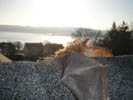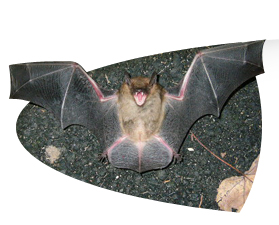Boston Bat Removal
The greater Boston area is home to two species of bats: small brown bats and large brown bats. Small brown bats are usually found in large colonies, typically ranging in size from 25 to 500 bats per colony.
Large brown bats are usually found in much smaller colonies. Colonies of large brown bats in the greater Boston area typically range in size from as little as four to as many as 100 bats. The average colony in the greater Boston area would be made up of around 25 bats.
Bats in Boston Houses and Attics
With very little natural habitat left for them, most bats in Boston now live in houses and attics. Most people wouldn't think that bats could survive in such an urban area, but they actually thrive. The caves and rock formations the bats once called home have been replaced by condominiums and large houses. Bats in Boston have simply adapted to their changing surroundings and moved in with humans. The large houses in the metropolitan Boston area provide all the shelter that a bat needs to survive and a large mosquito population provides their food source. It is hard to estimate the percentage of houses that bats inhabit in our area. From years of working in the field, studying bats and providing bat removal in Boston, it would be my educated guess that approximately 50% of the houses and buildings in our area have at least some bat guano either in the attic or under the trim on the exterior of the house. With so many bats living in houses and attics, problems frequently occur. Bats drop down into the living space from attics on a daily basis in the summer months. Every July and August we are inundated with calls for bats that have gotten into the living space of a house and wreaked havoc on the home's occupants. This usually happens in the middle of the night when bats are most active. If you have had a bat in your house please read this page for more information on how to safely handle the problem.
Boston Bat Exclusion Services
BatGuys Wildlife Service specializes in both bat exclusion and bat removal in Boston. We frequently perform successful exclusion projects on the older Colonial and Victorian style houses in the Greater Boston Area. These older style houses are like luxury condominiums for bats in our area. In the summer months bats will rest in attics during the daytime and leave shortly after dusk to feed on mosquitoes and other flying insects. Bats will sometimes make several trips in an out of the attic during the night. It is during their entrances and exits when bats are usually heard or seen by the homeowner. We frequently get calls from people who are hearing scratching or high-pitched chirping in their ceilings or walls. Most of the time these noises turn out to be bats. When inspecting for a bat infestation we look for things like bat guano and openings in the roof to help us assess the situation. Once we have analyzed the problem we will create a proposal that will detail what needs to be done and the costs associated with the project. Please see our bat removal page for more information on bat exclusion.
Bats and the Boston Environment
Bats are actually important to Boston. The Greater Boston area is home to millions of mosquitoes during the summer months. Some of these mosquitoes carry diseases such as eastern equine encephalitis. Both species of our native bats feed heavily on mosquitoes and are instrumental in keeping the mosquito population in check. For this reason bats in the Boston area are extremely beneficial to the environment. A single bat of either species can eat over 600 mosquitoes in a one-hour period. This helps control the mosquito population, reducing the number of diseased mosquitoes in the Boston area.
Lets do some math. One million bats in the Greater Boston area. Each one of these bats can eat in excess of four thousand mosquitoes each night. Thatís four billion mosquitoes that are eaten by bats each night in the Greater Boston area alone. Now, can you imagine what it would be like if these bats didnít exist? Imagine if wildlife control operators and pest control companies killed all the bats that they encountered. Our area would be greatly over-infested with disease-ridden mosquitoes. This would create a tremendous health hazard. This is why it is very important that you hire a company that will not harm bats. Other than rabies testing for a bat that bit a human there is no need to kill bats whatsoever. At BatGuys, we pride ourselves on the safe and humane bat removal techniques we use.



